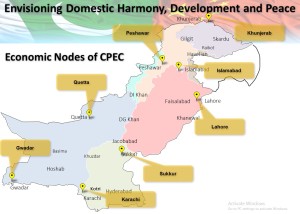CPEC: A road to prosperity of the region
By Furqan Rao
ISLAMABAD, Sep 13 (APP): Destined for a common destiny, that is,strengthening of economy, promotion of trade and to achieve other socio-economic benefits, Pakistan and China are all set to execute the $46 billion China-Pakistan Economic Corridor (CPEC), embedding a combination of roads, railways, power generation, Information Technology network and development of a seaport.
The historic economic package offered by China has been termed as a gift to Pakistan and a splendid display of friendship between the two countries.
The project would provide an opportunity to people of both the countries to further strengthen their deep rooted relations through exchange of personnel of different professions.
The CPEC would comprise of three routes including western, central and eastern, having a total length of approximately 3000 kilometers that will connect Gawadar seaport with Kashgar, China.
The western route originating from Gawadar will pass through Turbat, Panjgur, Nag, Basima, Sorab, Qalat, Quetta, Qilla Saifullah, Zhob and reach Dera Ismail Khan before leading to Islamabad. A couple of sections of the road between Gawadar and Quetta are currently at an advanced stage of construction.
The second (central) route will originate from Gawadar and reach Dera Ismail Khan via Basima, Khuzdar, Sukkur, Rajanpur, Layyah, Muzaffargarh and Bhakkar, while the third route will include Gawadar, Basima, Khuzdar, Sukkur, Rahimyar Khan, Bahawalpur, Multan and Lahore/Faisalabad and then reach Islamabad.
“Experts in Pakistan believe that the economic corridor will not only benefit the country in terms of economy and security, but also contribute to regional peace, stability and prosperity,” said Dr. Ejaz Hussain an Assistant Professor of the IQRA University.
However, in order to reap the fruits of this mega project, the two countries must remain alert to foil conspiracies against it as it has run alarm bells in the region by challenging the interests of many states.
“CPEC I truly think is a game changer and would certainly boost economy of the country,” said Dr. Ghulam Ali, an expert on China Pakistan relations and a postdoctoral fellow at Peking University, Beijing.
Talking to APP, he said, however, a lot of work was still needed to be done on Pakistan side especially in terms of eliminating terrorism and certain other issues.
Professor Rifaat Hussain, Dean of the Social Sciences Department of the National University of Science and Technology NUST, opined that CPEC had to be viewed holistically and not narrowly as a game changer meant only for Pakistan and China. Infact, it was a win-win project for all of China’s neighboring countries, he added.
Judged by the long history of their cordial bilateral relations, shared regional and strategic outlooks, absence of territorial disputes, high degree of mutual trust, it could be predicted that the dynamics of Sino-Pakistan entente cordiale would not be undamentally altered in the foreseeable future, Professor Riffat said.
The Corridor would not only provide a source of livelihood to millions of people but also act as a bulwark against forces of terrorism and extremism.
The CPEC would connect the road and the belt. Located at crossroads of Central Asia, the Middle East and South Asia, Pakistani seaport of Gawadar, on northern Arabian Sea near Persian Gulf, was at the confluence of both the Road and Belt.
By linking China with Arabian Sea, the CPEC would optimize trade potential and enhance energy security of China, Pakistan and the region besides benefiting around three billion people of the Asia and Middle East. Likewise, the local population of, for example, Gilgat-Baltistan and Xinjiang, will get new employment and work opportunities.
Dr. Muhammad Khan, Head of Department of International Relations, Faculty of Contemporary Studies (FCS) of National Defence University said CPEC was going to be a reality, since it serve the strategic and national interests of both the countries; China and Pakistan.
He said the All Parties Conference (APC) had supported the construction of CPEC and the inflow of massive Chinese investment in Pakistan.
The over projected terrorism, militancy and security issues in Pakistan were going to recede with each part of the CPEC completing. The unemployed youth, once got a job, would be intergraded into the economic activities, Dr. Khan added.
There was a need that Pakistani Media should play a positive role and make new narratives; dispelling some of the misperceptions deliberately created against this strategic project, he advised.
Let us defeat the external factors opposing the CPEC by presenting a united Pakistani. Peace and security would bring economic growth and economic growth will ensure a standard living for everyone in Pakistan, he opined.






